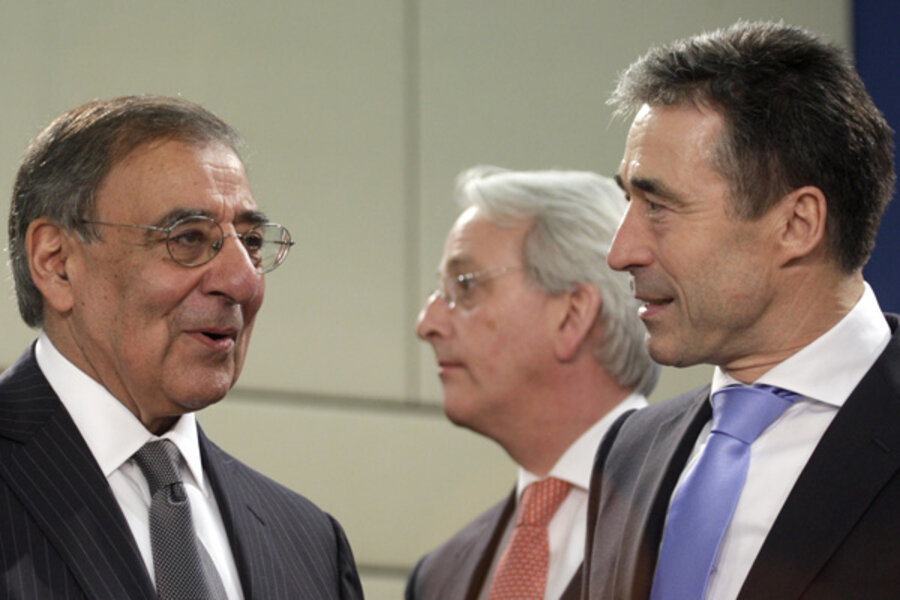Plan for early end to US combat role catches Afghan officials by surprise
Loading...
• A daily summary of global reports on security issues.
US Secretary of Defense Leon Panetta announced yesterday that American troops in Afghanistan would step back from their combat role in Afghanistan as early as mid-2013, more than a year before the full withdrawal scheduled for 2014.
The announcement caught the Afghan government and Army by surprise, Reuters reports. "A decision to push this a year earlier throws out the whole transition plan. The transition has been planned against a timetable and this makes us rush all our preparations," a senior Afghan security official said. "If the Americans withdraw from combat, it will certainly have an effect on our readiness and training, and on equipping the police force," the official said, adding that the US did not inform Afghanistan ahead of the announcement.
The New York Times attributes the unexpectedly early end to US troops' combat role to the Obama administration's "eagerness" to end the second war it inherited from the Bush administration.
In his announcement, Mr. Panetta downplayed French President Nicolas Sarkozy's decision to withdraw France's troops by the end of 2013, a year ahead of its NATO allies, the Times reports. His decision came after an Afghan soldier killed four French soldiers who were on a training mission – an action that has not been uncommon in the war there.
The Los Angeles Times reports that Panetta's decision was done to preempt any similar decisions from other NATO allies.
By announcing a specific timetable, US officials are hoping to head off a push by allies to pull out their forces more quickly. Public support for the war is falling in many countries, and with their economies struggling, governments are under pressure to trim their defense budgets.
With the expedited end to a combat role, US troops will turn primarily to training and advisory missions, similar to the way the withdrawal unfolded from Iraq, with the US focused on training Iraqi soldiers for more than a year before the last convoy left the country. Whether Afghan troops are ready to take on the central role is unclear – both the Army and police are "plagued by corruption, operational and personnel problems," according to the Los Angeles Times.
Afghan forces already have assumed control in Kabul, the capital, and some other areas, but those were already largely peaceful. The US and its allies retain military responsibility for the most violent parts of the country.
…
A senior Defense Department official traveling with Panetta said the US-led force "still needs to be there in robust fashion to back them up" until the end of 2014.
The Christian Science Monitor reports that the "steady string" of attacks on Western troops by rogue Afghan soldiers and police is both undermining military cooperation and heightening concerns about a Taliban infiltration of both the police and Army. There have been 42 such attacks since 2007, leaving 70 troops dead and many more wounded.
Pentagon officials warn of the potential “insider threat” from Taliban infiltrators, who are particularly difficult to detect. “A successful infiltrator is more likely [to be] competent and experienced,” warned Pentagon testimony submitted to the committee.
As a result, Taliban insurgents impersonating Afghan security forces may inadvertently be given important jobs within their unit. This, in turn, may allow them to facilitate “insurgent efforts by providing intelligence on coalition force tactics or movement, or by targeting high-profile ANSF or Afghan government officials.”
On top of those concerns, according to a NATO report leaked to the BBC, the Taliban still have substantial support among Afghans and receive assistance from Pakistani security services – an accusation Pakistan denied, the BBC reports. The report, based on on 27,000 interrogations with more than 4,000 captured Taliban, Al Qaeda, and other foreign fighters and civilians, states that Pakistan is aware of the location of several senior Taliban leaders.
The report also says that interest in joining the Taliban is on the rise among Afghans, including members of the government, and that the reduction of attacks in some parts of the country is a facade intended to hasten the withdrawal of coalition forces from the area so the Taliban can move in – often with the help of the police and Army.





